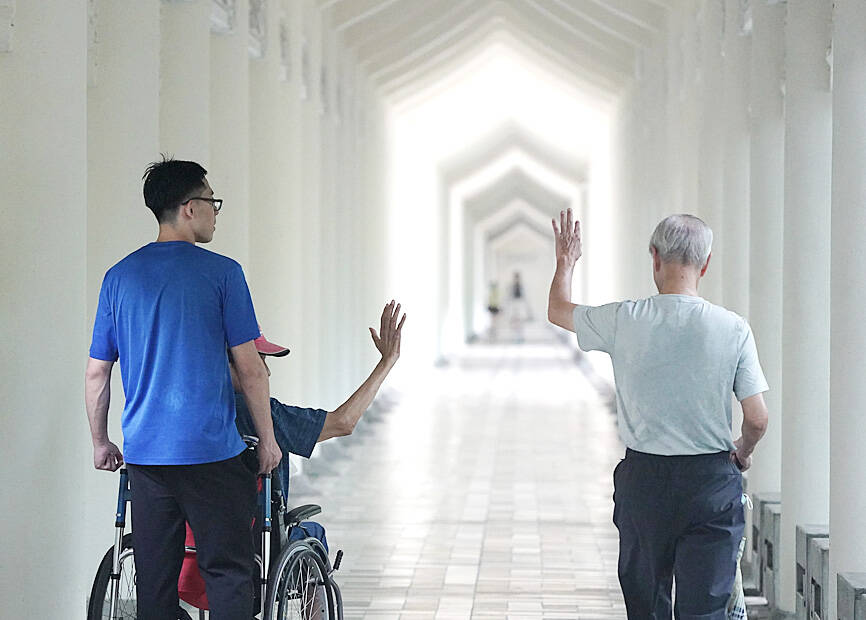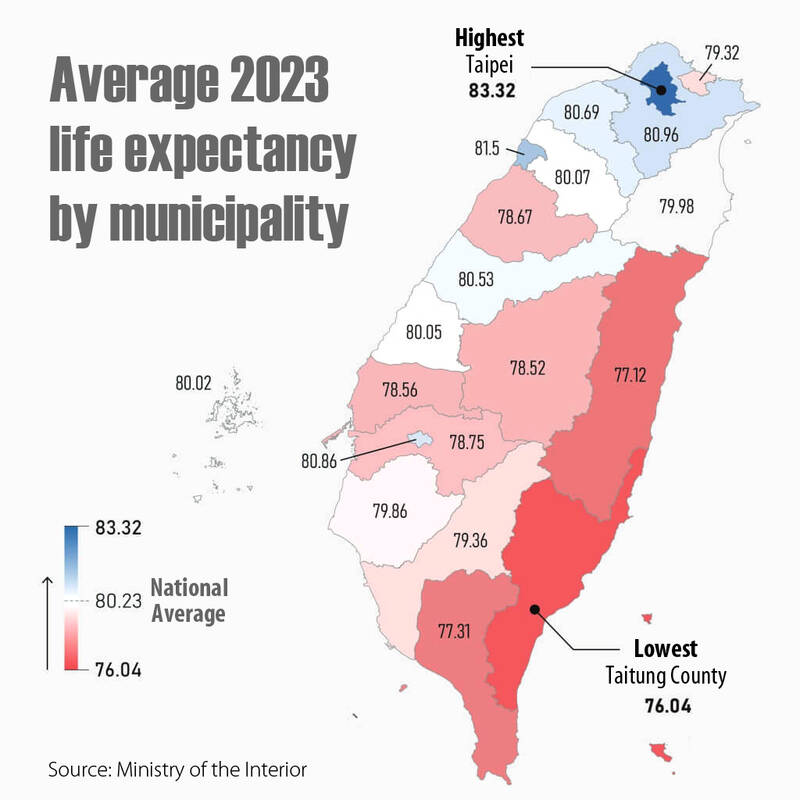The average life expectancy in Taiwan last year was 80.2 years, a 0.4-year increase from 2022, Ministry of the Interior data showed yesterday.
The figure for men was 76.9 years and 83.7 for women, up 0.3 years and 0.5 years respectively from the year before, the ministry said in the 11th edition of the annual mortality report.
Life expectancy for men in Taiwan was seven years higher than the global average and it was nine years higher for women, it said.

Photo: CNA
Residents of northern Taiwan tend to live longer than those in the south, with Taipei residents having an average life expectancy of 83.8 years, the highest in the nation, the report said.
The other five special municipalities had life expectancies in descending order of New Taipei City, Taoyuan, Taichung, Tainan and Kaohsiung, it said.
Hsinchu City residents had the highest life expectancy of areas outside the special municipalities at 81.5 years, while Taitung County residents had the lowest at 76 years, it said.

The figures for Taitung and Hualien counties were 4.2 years and 3.1 years below the national average, although the gap closed by 1.2 years and 0.4 years respectively from the year before.
The report was released a day after President William Lai (賴清德) said that the government would work to increase the average lifespan of people living in Taiwan to 82 years over eight years.
“Over the next eight years, we aim to increase the average life expectancy of our citizens to 82 years from 79” and make more of those years healthy, Presidential Office spokesman Xavier Chang (張惇涵) quoted Lai as saying.
Chang was addressing a news conference a day after the first meeting of the Healthy Taiwan Promotion Committee, one of three ad hoc groups established by the Presidential Office.
“At the same time, the child mortality rate should be lowered from 5.3 per 1,000 to below 4 per 1,000,” Chang quoted Lai as saying.
Lai underscored the importance of improving the long-term care system and implementing measures to prevent chronic diseases, enhance screening, and improve the health of children and indigenous people, Chang said.
Few other details were offered.
The mortality rate for children under five was 5.1 per 1,000 in 2022, Ministry of Health and Welfare data showed, lower than the Organisation for Economic Co-operation and Development average, which was 6 per 1,000 in 2022.
However, Taiwan has not performed as well as South Korea and Japan. In 2022, the child mortality rate was about 3 per 1,000 in South Korea and 2 per 1,000 in Japan.
The Executive Yuan last month pledged to allocate about NT$13.5 billion (US$422.19 million) for an updated medical care program targeting pregnant women, newborns and children from fiscal 2025 to 2028, nearly five times the allocation for the current four-year program.
On Thursday, the 35-member health committee also touched on the National Health Insurance (NHI) system, with Lai pledging to continue reforming the system.
Chang said that while the president was open to ideas of how to make the NHI system more financially sustainable, he emphasized the need to keep it accessible to everyone.
Meanwhile, Shih Chung-liang (石崇良), head of the National Health Insurance Administration, said that due to Taiwan’s low birthrate and aging population, insurance revenue collected last year covered only about 75 percent of NHI expenditure.
To bridge the gap, the remaining costs were primarily covered by tax revenue, including tobacco taxes, along with additional financial support, Shih said.
He was referring to NT$24 billion that was put into the system from the government’s general budget last year.
While several potential measures to alleviate the financial strain on the NHI system were proposed, such as collaborations with private insurance companies or increasing NHI premiums, no conclusion was reached during the four-hour meeting, Chang said.

The CIA has a message for Chinese government officials worried about their place in Chinese President Xi Jinping’s (習近平) government: Come work with us. The agency released two Mandarin-language videos on social media on Thursday inviting disgruntled officials to contact the CIA. The recruitment videos posted on YouTube and X racked up more than 5 million views combined in their first day. The outreach comes as CIA Director John Ratcliffe has vowed to boost the agency’s use of intelligence from human sources and its focus on China, which has recently targeted US officials with its own espionage operations. The videos are “aimed at

STEADFAST FRIEND: The bills encourage increased Taiwan-US engagement and address China’s distortion of UN Resolution 2758 to isolate Taiwan internationally The Presidential Office yesterday thanked the US House of Representatives for unanimously passing two Taiwan-related bills highlighting its solid support for Taiwan’s democracy and global participation, and for deepening bilateral relations. One of the bills, the Taiwan Assurance Implementation Act, requires the US Department of State to periodically review its guidelines for engagement with Taiwan, and report to the US Congress on the guidelines and plans to lift self-imposed limitations on US-Taiwan engagement. The other bill is the Taiwan International Solidarity Act, which clarifies that UN Resolution 2758 does not address the issue of the representation of Taiwan or its people in

US Indo-Pacific Commander Admiral Samuel Paparo on Friday expressed concern over the rate at which China is diversifying its military exercises, the Financial Times (FT) reported on Saturday. “The rates of change on the depth and breadth of their exercises is the one non-linear effect that I’ve seen in the last year that wakes me up at night or keeps me up at night,” Paparo was quoted by FT as saying while attending the annual Sedona Forum at the McCain Institute in Arizona. Paparo also expressed concern over the speed with which China was expanding its military. While the US

SHIFT: Taiwan’s better-than-expected first-quarter GDP and signs of weakness in the US have driven global capital back to emerging markets, the central bank head said The central bank yesterday blamed market speculation for the steep rise in the local currency, and urged exporters and financial institutions to stay calm and stop panic sell-offs to avoid hurting their own profitability. The nation’s top monetary policymaker said that it would step in, if necessary, to maintain order and stability in the foreign exchange market. The remarks came as the NT dollar yesterday closed up NT$0.919 to NT$30.145 against the US dollar in Taipei trading, after rising as high as NT$29.59 in intraday trading. The local currency has surged 5.85 percent against the greenback over the past two sessions, central